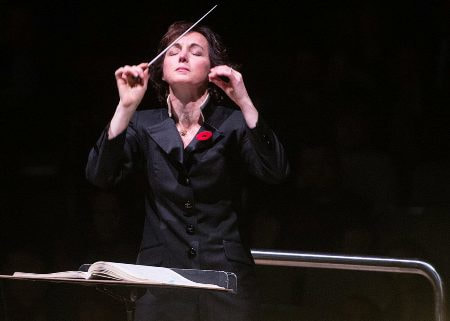 Canadian conductor Tania Miller.
Canadian conductor Tania Miller. Since the end of World War I, Remembrance Day (Canada’s version of Veterans Day) has been a significant occasion for Canadians. Between 1914 and 1918, the Dominion of Canada lost over 60,000 soldiers in the “War to End All Wars.” Nowadays, there are memorial observances and events across the country from coast to coast, every November 11.
Indeed, so solemn-of-purpose and ceremonial in form was this event that it almost seemed to lie outside the purview of music criticism – just as it would be strange and inappropriate to review a religious ceremony.
Almost.
There was one work on the program that demands to be written about: Afghanistan: Requiem for a Generation, by Canadian composer Jeffrey Ryan, with a libretto by Canadian poet Suzanne Steele. This nine-movement requiem is an elaborate and ambitious piece, scored for large orchestra, chorus, children’s chorus, and four vocal soloists. It was premiered by the Calgary Philharmonic Orchestra in 2012, and it has also been performed by the Vancouver Symphony. On this occasion, it filled the entire second half of the TSO’s program.
I must admit that I approached the piece with some trepidation, fearing it would either drip with sentimentality or (worse) would offer some kind of post-modern critique of war. But Afghanistan does neither; rather, it presents the war in Afghanistan – to which Canada contributed 40,000 soldiers between 2001 and 2014 – in an immediate, personal, and visceral way. Steele was there, in the thick of the conflict, as Canada’s first official “war poet.” Her poetry, derived from what she saw and heard, captures the chaos and pain of battle firsthand, in short, jagged lines such as “fatigue, despair, ricochet, near miss, putrid, poison, lousy air.” Wisely, the TSO projected the text as supertitles on two large screens, so not a word was lost on the audience.
Faced with the challenge of working these texts into a coherent, large-scale musical composition, Ryan succeeded brilliantly. To be sure, he was the right man for the job: as the Vancouver Symphony’s composer-in-residence from 2002-07, Ryan developed a sure-handed ability to write effectively for a large orchestra. In Afghanistan, he imaginatively placed Steele’s poetry within the framework of a requiem mass, juxtaposing snippets of liturgical Latin with Steele’s English, French, and Pashto texts. (In this way, Afghanistan bears some resemblance to Vaughan Williams’ Dona nobis pacem.)
Ryan created a vivid score, making skillful use of the musical forces at his disposal. He’s not shy about big, dramatic tutti passages – but there are also some more intimate moments, such as the opening of the “Kyrie” movement, with four solo cellos. In its harmonic language, Afghanistan is fundamentally tonal, sometimes with slow-moving, momentous chords on the bottom of the orchestral texture juxtaposed against edgy dissonance above. A full hour in duration, Afghanistan has no longueurs or weak sections; it’s a compelling piece, unfailingly effective throughout.
The vocal soloists at the front of the stage were four of the best singers Canada currently has to offer. Soprano Measha Brueggergosman was the first to rise, successfully negotiating some intricate ornaments. Mezzo-soprano Allyson McHardy shone in some lush, low passages. And the two men – tenor Colin Ainsworth and baritone Brett Polegato – sang (and also spoke) with dramatic urgency. Much credit for the success of the performance is of course due to Miller, who drew the large musical forces at her disposal into a unified whole.
The first half of the program was entirely suitable to Remembrance Day. The Lento movement from Vaughan Williams’ Symphony No. 2 (“A London Symphony”) was nicely shaped. So too was Vaughan Williams’ The Lark Ascending, featuring violin soloist (and TSO concertmaster) Jonathan Crow. However, the decision to place Crow in a balcony, away from the stage, did little to enhance the intimacy of this piece.
There was also a “sesquie” to open the program, one of 40 short fanfares that the TSO has commissioned from Canadian composers to celebrate Canada’s 150th anniversary. Like most sesquies I’ve heard this year, this one – Fallen, by Jordan Pal – has too many ideas crammed into too few minutes.
© Colin Eatock 2017
 RSS Feed
RSS Feed

